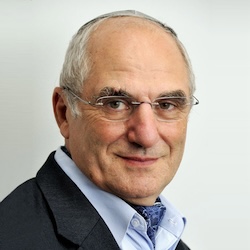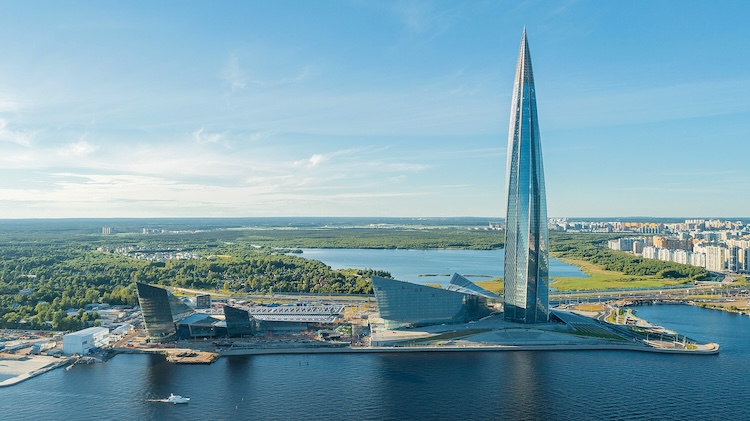By Yakov M. Rabkin*
This article was originally published on Pressenza.
MONTREAL, Canada | 12 June 2024 (IDN) — There has been ample coverage of a marathon press conference held by Vladimir Putin for heads of foreign and Russian press agencies earlier this month. Predictably, most attention was drawn to his answer to a British journalist as to possible use of nuclear weapons in the current tug-of-war with the West.
What attracted less notice was the setting: the world’s northernmost skyscraper built on the outskirts of Saint-Petersburg by the Gazprom, Russia’s prime hydrocarbons conglomerate. Both the site and the time of the event can tell us much about the country and its evolving place in the world.

The skyscraper is named Lakhta Centre, after the former village where it is built. It was from Lakhta that a gigantic granite rock was hauled eight kilometres to the centre of the city in 1769-70 to become the pedestal of the majestic statue of Peter the Great, the city’s founder. Poet Alexander Pushkin called it the Bronze Horseman in his eponymous poem, and this is how the monument has since been referred to by locals and visitors alike.
Straight from the press conference, Putin went to visit Pushkin’s lycée as part of the celebration of the poet’s 225 th birthday. During the visit, Vladimir Medinsky, Russia’s former culture minister, showed his boss a 19 th century map of the Russian Empire, with the Ukraine as its integral part. Medinsky, one may recall, headed the Russian delegation in peace negotiations in 2022, the process abruptly aborted by the Ukrainian side, reportedly under British and American pressure.
It is in the same poem that Pushkin coined another expression, which became a current idiom: “a window to Europe”. Indeed, Peter founded the city as an opening to European ideas, culture, science, and technology. The Bronze Horseman was conceived by Étienne Maurice Falconet, recommended to the then empress Catherine the Great, by Denis Diderot, who spearheaded the French Enlightenment. In fact, much of the city was originally built by French, Italian and Swiss architects.
The 462-meters-high skyscraper was also built by a European architect, Tony Kettle of Scotland. The tower overlooks the Gulf of Finland and symbolizes the city’s creative vocation as a window to Europe. But thousands of sanctions imposed on Russia since 2014 have severed most links with the rest of Europe. Nowadays, a plane trip to Helsinki, Finland, that used to take 52 minutes lasts nearly ten hours, with a transfer in Istanbul. The new iron curtain is a lot more solid than its cold war predecessor. Under Stalin, at the height of the Korean War, trains connected Russia to most European countries. Under Brezhnev, while Americans fought Soviet-equipped Vietnamese soldiers, regular flights were inaugurated between Moscow and New York.
Turning eastwards
As Russia sees its window to Europe walled up, the country has been turning eastwards. The press conference took place on the margins of the Saint-Petersburg Economic Forum, a major event that used to attract scores of world leaders, including those of Finland, France, Germany and Japan, as well as UN Secretaries Generals and Presidents of the European Commission.
This year, the forum attracted as many participants as before, over 21 000 from 139 countries, but mostly from the Global South, or the world majority. Fewer Western participants took part, as Western sanctions disrupted normal economic relations and Western governments discouraged participation. In one so far unique case, three armed uniformed Customs and Border Protection officers stopped an American en route to Istanbul and Saint-Petersburg from boarding the plane in New York and seized his passport, apparently on the order of the U.S. Department of State.
The forum in Saint-Petersburg embodies the current evolution of the world. What was initially meant as a means of punishing Russia by cutting it off from its usual partners in the West, has turned out to be a blessing in disguise. According to the World Bank, Russia’s economic growth this year is higher than in the rest of Europe. Moreover, economic dynamism can be found in the eastern part of the Eurasian continent, while its western lands, most of them members of the European Union, experience economic slowdown.
It is ironic that this pivot to the East is highlighted by an event taking place in Saint-Petersburg, a city almost as far from Russia’s eastern borders as it is from Montreal and New York. An erstwhile window to Europe has become an enticing gateway to Asia.
Original link: https://www.pressenza.com/2024/06/in-spite-of-geography-a-window-to-europe-becomes-a-gateway-to-asia/
*Yakov M. Rabkin is Professor Emeritus of History at the Université of Montréal. His publications include over 300 articles and a few books: Science between Superpowers, A Threat from Within: a Century of Jewish Opposition to Zionism, What is Modern Israel?, Demodernization: A Future in the Past and Judaïsme, islam et modernité. He did consulting work for, inter alia, OECD, NATO, UNESCO and the World Bank. E-mail: yakov.rabkin@umontreal.ca. Website: www.yakovrabkin.ca [IDN-InDepthNews]
Photo: Lakhta Center complex in 2021. Credit: Anton Galakhov CC BY-SA 4.0


